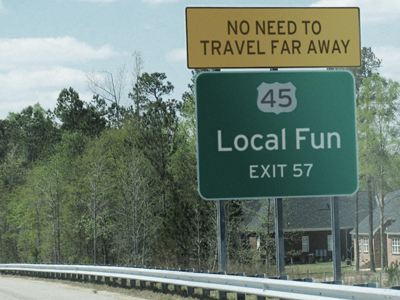Staycations: Much more than a trend..
 A staycation, (a term which was only recently added to the 2009 version of the Merriam-Webster's Collegiate Dictionary) according to The New York Times, is "a neologism used by [those] who prefer to unravel the mysteries of the world from the comfort of their living room couches." Staycations have achieved high popularity in the US during the financial crisis of 2007–2010 in which unemployment levels and gas prices were quite high. However, the long-lasting global economic crisis and its impact on the tourism industry caused a lot of skepticism to the travel industry and made a lot of analysts to believe that staycations is not just a trend but a ssocial phenomeno which is here to stay. To this direction Sarah Sharma (M/C Journal, Vol. 12, No. 1 (2009) points out that:
A staycation, (a term which was only recently added to the 2009 version of the Merriam-Webster's Collegiate Dictionary) according to The New York Times, is "a neologism used by [those] who prefer to unravel the mysteries of the world from the comfort of their living room couches." Staycations have achieved high popularity in the US during the financial crisis of 2007–2010 in which unemployment levels and gas prices were quite high. However, the long-lasting global economic crisis and its impact on the tourism industry caused a lot of skepticism to the travel industry and made a lot of analysts to believe that staycations is not just a trend but a ssocial phenomeno which is here to stay. To this direction Sarah Sharma (M/C Journal, Vol. 12, No. 1 (2009) points out that:
''The emergence of the Staycation occurred precisely at a time when American citizens were confronted with the reality that their mobility and localities, including their relationship to domestic space, were structurally bound to larger geopolitical forces. The Staycation was an invention deployed by various interlocutors most threatened by the political possibilities inherent in stillness. The family home was catapulted into the circuits of production, consumption, and exchange. Big TV and Big Box stores furthered individual’s unease towards having to stay at home by discursively constructing the gas prices as an impediment to a happy domestic life and an affront to the American born right to be mobile. What was reinforced was that Americans ideally should be moving, but could not. Yet, at the same time it was rather un-American not to travel. The Staycation was couched in a powerful rhetoric of one’s moral duty to the nation while playing off of middle class anxieties and senses of privilege regarding the right to be mobile and the freedom to consume. The Staycation satiates all of these tensions by insisting that the home can become a somewhere else.''
 Throughout the 2007-2010 period, lifestyle experts, representatives from major retailers, and avid Staycationers filled morning slots on ABC, NBC, FOX, CBS, and CNN with Staycation tips. CNN highlighted the Staycation as a “1st Issue” in their Weekend Report on 12 June 2008 (Alban). Throughout the summer ABC News’ homepage included links to specific products and profiled hotels, such as Hiltons and Holiday Inns, where families could at least get a few miles away from home (Leamy). USA Today, in an article about retailers and the Staycation, reported that Wal-Mart would be “rolling back prices on everything from mosquito repellent to portable DVD players to baked beans and barbecue sauce”. US media continued to build over the staycation phenomenon by gradually connecting it with all major issues of our days including the global financial downturn and the global warming. As Shara Sarma succesfully points out:
Throughout the 2007-2010 period, lifestyle experts, representatives from major retailers, and avid Staycationers filled morning slots on ABC, NBC, FOX, CBS, and CNN with Staycation tips. CNN highlighted the Staycation as a “1st Issue” in their Weekend Report on 12 June 2008 (Alban). Throughout the summer ABC News’ homepage included links to specific products and profiled hotels, such as Hiltons and Holiday Inns, where families could at least get a few miles away from home (Leamy). USA Today, in an article about retailers and the Staycation, reported that Wal-Mart would be “rolling back prices on everything from mosquito repellent to portable DVD players to baked beans and barbecue sauce”. US media continued to build over the staycation phenomenon by gradually connecting it with all major issues of our days including the global financial downturn and the global warming. As Shara Sarma succesfully points out:
"'Playing on the American democratic ideals of freedom of mobility and activating one’s identity as a consumer left little room to re-think how life in constant motion (moving capital, moving people, moving information, and moving goods) was partially responsible for the energy crisis in the first place. Instead, staying at home became a way for the American citizen to support the floundering economy while waiting for gas prices to go back down. And, one wouldn’t have to look that much further to see that the Staycation slips discursively into a renewed mission for a just cause – the environment. For example, ABC launched at the end of the summer a ruse of a national holiday, “National Stay at Home Week” with the tag line: “With gas prices so high, the economy taking a nosedive and global warming, it's just better to stay in and enjoy great ABC TV.” It comes as no shock that none of the major networks covered this as an environmental issue or an important moment for transformation. In fact, the air conditioning units in backyard tents attest to quite the opposite. Instead, the overwhelming sense was of a nation waiting at home for it all to be over. Soon real life would resume and everyone could get moving again.''
[youtube=http://www.youtube.com/watch?v=SLdmBBXAGLU]
[youtube=http://www.youtube.com/watch?v=tSUG0BMLa6c&feature=related]
 In the other side of the Atlantic and UK in specific, VisitEngland announced a couple of weeks ago its findings from the first significant research into the staycation phenomenon . Tourism statistics indicate that in 2009, England enjoyed an 18 per cent increase in the number of holiday trips taken with holiday makers spending £1bn more than in the previous year. The research discovered that the uplift in tourism last year has helped awaken a latent pride in England as a holiday destination, and as a result, in the longer term, almost half the population expect to take more domestic breaks then than they did in the past.
In the other side of the Atlantic and UK in specific, VisitEngland announced a couple of weeks ago its findings from the first significant research into the staycation phenomenon . Tourism statistics indicate that in 2009, England enjoyed an 18 per cent increase in the number of holiday trips taken with holiday makers spending £1bn more than in the previous year. The research discovered that the uplift in tourism last year has helped awaken a latent pride in England as a holiday destination, and as a result, in the longer term, almost half the population expect to take more domestic breaks then than they did in the past.
The research identified two groups who changed their behaviour in 2009 to generate the uplift in domestic holidays. Together, these two groups, the ‘Staycationers’, account for one in four of the population. One group ‘Switchers’ accounted for 13 per cent of respondents and included a high proportion of families. This group was primarily motivated to ‘switch’ a foreign holiday for one at home because of financial constraints.
The second group, ‘Extras’, accounted for 15 per cent of respondents and tended to be younger, and were more likely to be single. This group was less affected by the credit crunch and their economic situation and was more motivated by a desire to explore the UK and go somewhere new. In addition to more domestic breaks they also took more overseas breaks.
The quality of experience has certainly led those who took a holiday at home last year to consider including England as part of their holiday mix this year. 86 per cent of Staycationers (those groups that the research identified as responsible for the uplift) described their holiday experience as ‘excellent’ or ‘very good’, and 80 per cent described their break as ‘excellent’ or ‘very good’ value. Over half said their holiday was better value than the overseas holiday it replaced.
Findings from this research show that 90 per cent of Staycationers expect to take at least one break in England this year. Some people will choose to travel abroad again when they can afford it, but with half the population expecting that they will take more domestic breaks even beyond 2010, the year of the staycation seems likely to have a longer term impact for English Tourism.
James Berresford Chief Executive VisitEngland said: These findings prove that England’s new found popularity as a holiday destination is not merely a flash in the pan. Of course, circumstances last year certainly encouraged more Brits to take a break at home, however this research shows that there is a more permanent shift in attitudes to holidaying at home. It’s a hugely rewarding experience to rediscover your own country and it’s clear that once you do, you want to do it again and again.’
He goes on to say: ‘England is a wonderful destination. We have some of the world’s best countryside, coast line, cities, festivals and people – literally on our doorstep! With so much on offer to see and do I’m not surprised England is becoming more and more popular with Brits as a top class holiday destination.’
The research was carried out over two stages. In an initial quantitative stage ,1000 adults aged 18+ were interviewed about their attitudes to the credit crunch, their holiday behaviour in 2009 and their plans for 2010. A qualitative stage followed with 8 group discussions in London, Manchester, Birmingham and Leeds among respondents with a variety of opinions towards domestic breaks. (click here for the full report)
To conclude, the staycation phenomenon is just one example of a behavioral shift caused by a rapidly changing travel cost structure. Certain destinations are experiencing stronger staycation interest than others, but with a an international increase in major tourism markets and no foreseeable reprieve from high gas prices & other effects of the financial crisis it looks like the staycation isn’t going anywhere any time soon.

COMMENTS
Bigelow Tea Looks At Staycations As a Summer Vacation Alternative | Bigelow Tea Blog
[...] to get away from it all while staying close to home; all it takes is a well-plannedstaycation! A staycation is a break at home, or near to home, that takes advantage of local offerings you may not have [...]
Tips for Turning Your Home Into a Staycation | LesserEvil Life
[...] Tourism- Staycation Statistics Digg Diggvar dd_offset_from_content = 40; var dd_top_offset_from_content = 0; This entry was posted [...]